Whenever I open PM groups on Reddit, Facebook, or WhatsApp, I see people asking the same question: “Will AI take my job?” It’s a valid concern. I’ve already seen AI agents take over some basic product manager duties like:

AI is no longer the future — it’s right here, right now. In just a few clicks, you can create a short-term roadmap or develop research questions for market analysis.
So will PMs vanish amid the AI revolution? And as a PM, how can you future-proof your career?
This blog post talks about what AI can and can’t replace in the world of product management, along with the tools you can use and action items to start on today to become an AI-powered PM. By the end, you’ll be more aware of the reality of AI and how you can future-proof your PM career without worrying about whether AI will take your job away or not.
The launch of ChatGPT on November 30, 2022 changed and challenged the lives of PMs. In fact, it’s not only PMs, but the stakes are high for developers, engineers, designers, marketers, and sales professionals.
When I was at Zalando, I used to have two to three meetings with the UX and research teams to come up with research questions for users. Then, we used to come up with a structure for how we would save the research information. After doing the research, we manually used it to find out logical trends and come up with a hypothesis.
In 2025, you can do all of this with a simple series of prompts.
Here are some key trends that show AI is disrupting product management:
Traditionally, product decisions have been based on intuition, market research, customer feedback, and stakeholder feedback. But today, AI allows you to summarize user feedback at scale. PMs can use any AI-based tool for predictive analysis and even seek help building a roadmap
One of the big parts of product management is writing user stories and document requirements, as well as maintaining backlogs. But today, AI agents can automate all of these. Microsoft Copilot can draft example user stories from feature descriptions and you can add meeting transcripts to feature requirements
PMs (and especially those with a non-technical background) have always had a bit of a hard time working with technical teams. But AI is changing that. You can easily ask ChatGPT questions to understand technical aspects of software engineering. Some PMs are even skilled enough now to build an MVP without the help of technical teams.
AI isn’t just a tool anymore. It’s a fundamental shift in how product management has been done up to now. It’s reshaping every layer of product management. But, will AI replace PMs?
While AI is undoubtedly changing product management, it’s important to understand what parts of product management AI can actually replace:
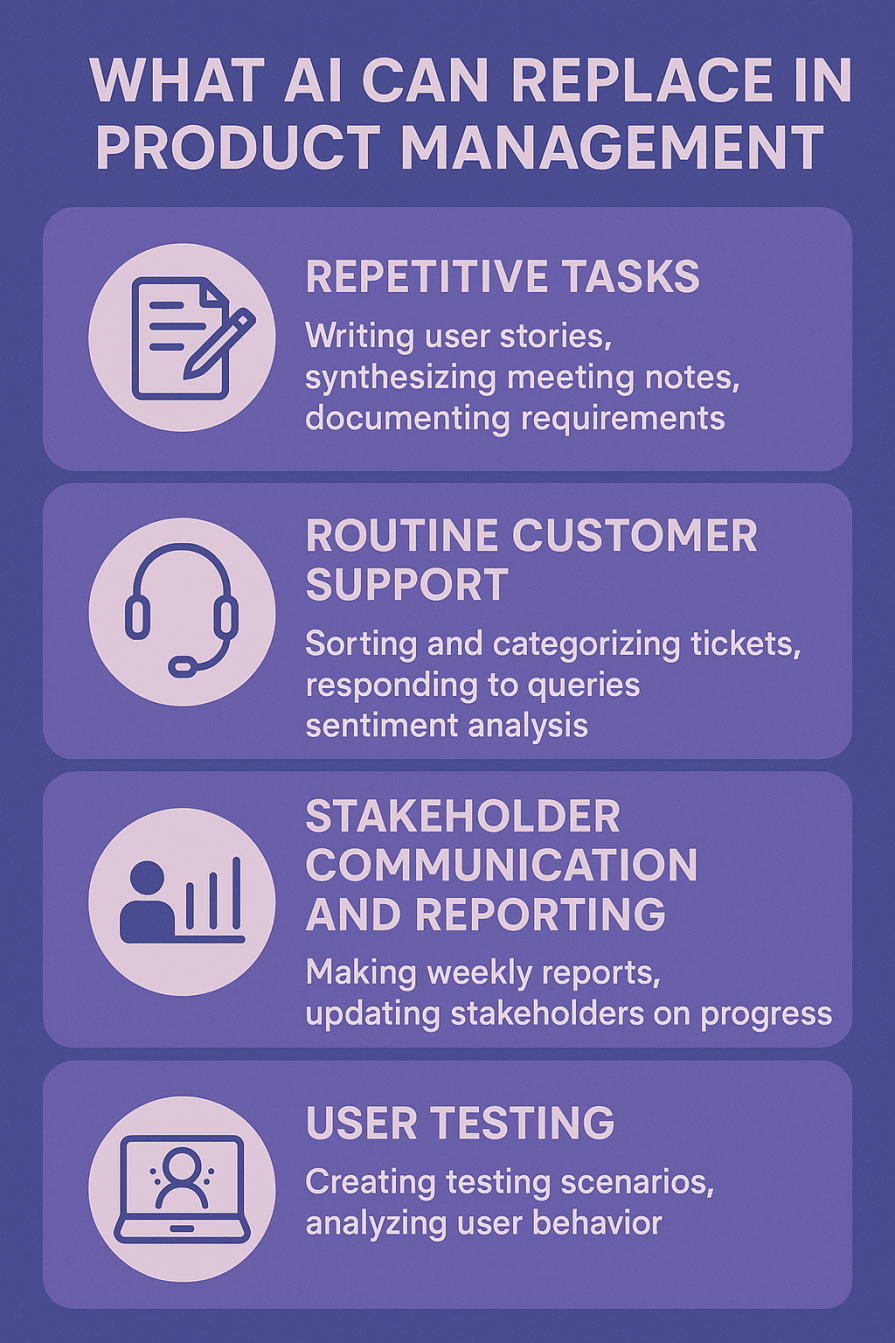
If you review the list above, you’ll notice that although these tasks are important, they don’t require a lot of domain expertise. But what about those tasks that require domain expertise? Will they also be replaced by AI?
While AI can replace some parts of product management, it can’t replace the core parts that remain deeply human. These are the areas where humans excel simply because they have feelings:
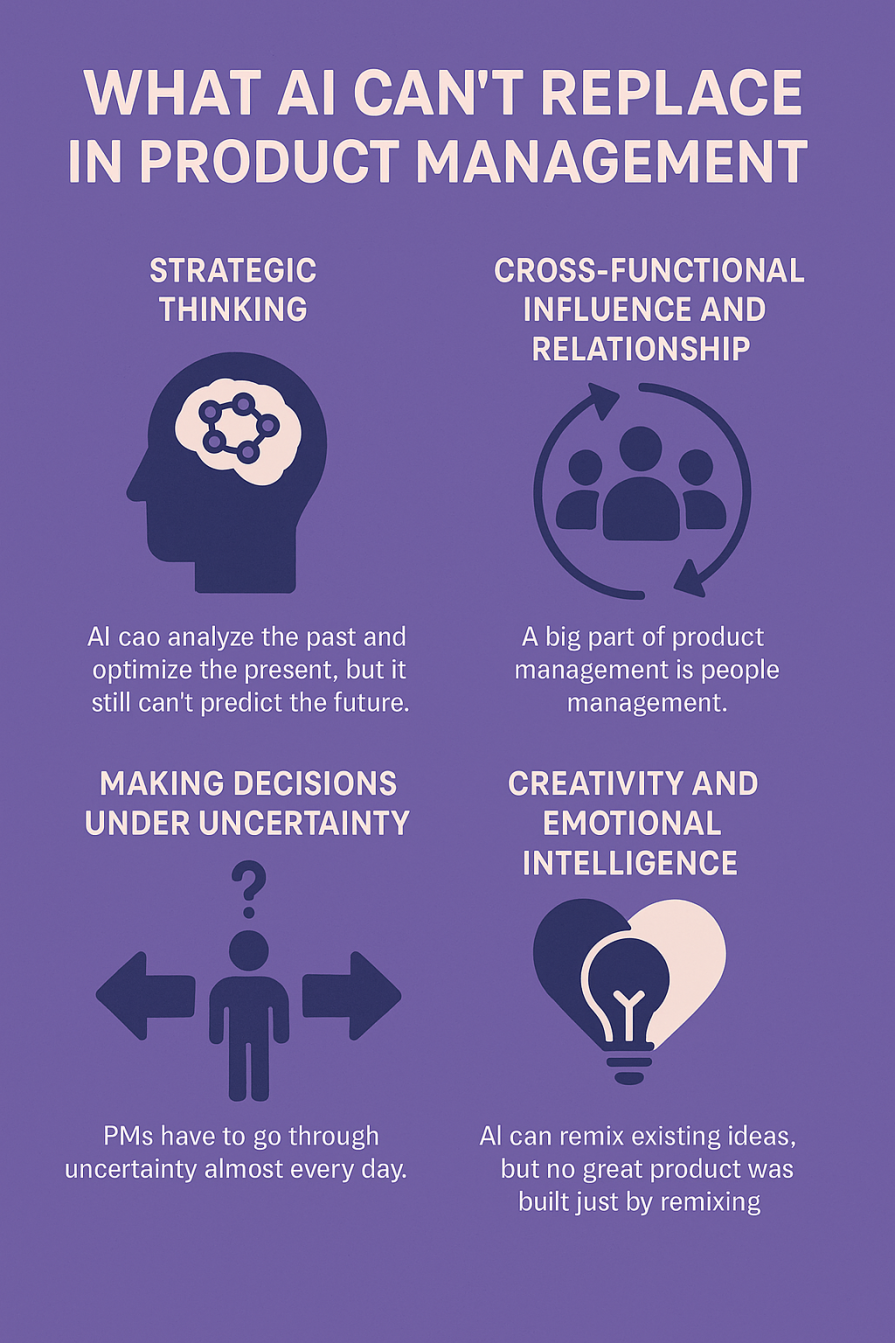
AI can analyze the past and optimize the present, but it still can’t predict the future. Predicting the future requires an understanding of human behavior and market context, as well as a sense of where the world’s heading.
This is what makes up your product vision and strategy, and no AI in its current form can replace humans to connect the dots between your market, customers, and company.
A big part of product management is people management. This means talking to multiple teams, understanding their expectations, and keeping everyone aligned. AI can’t navigate team dynamics, resolve conflicts, or inspire a group to chase a vision.
The 2020 pandemic was one of the biggest unplanned ever. On a smaller scale, PMs have to go through uncertainty almost every day. Sometimes it might be that a team member is sick, while other times you might not have as clear of data as you would like. AI can’t help with such uncertainties.
The last part of being human is that we can think on our own and have emotions. AI can remix existing ideas, but no great product was built by remixing alone. You need a bag full of creative thoughts and emotional intelligence to build something substantial.
At the same time, emotional intelligence plays a huge role in product success. Understanding team dynamics, navigating stakeholder motivations, interpreting user frustration, and balancing short-term delivery with long-term trust, requires deeply emotional, human decisions.
AI isn’t replacing PMs, but it’ll replace the PMs who don’t know how to leverage AI. This doesn’t mean an AI-powered PM will simply use ChatGPT and copy paste and its output. Think of these people as the ones who use AI to research deeper, find granular insights, and think bigger.
An AI-powered PM:
If you haven’t already started developing AI literacy, I highly recommend you to start.
To start implementing AI into your product management, try using some of the following tools:
| Tool name | Free or paid | Description | PM use-case |
| ChatGPT | Free (basic) / paid (pro) | Conversational AI for ideation, drafting, and problem-solving | Brainstorm features, write user stories, create docs, summarize research, mock interview scripts |
| Cursor | Free (basic) / paid (pro) | AI-powered code editor optimized for product builders that can’t code | Build MVPs, generate product prototypes, and collaborate on technical experiments |
| Perplexity AI | Free (pro version available) | AI search engine with citations and web-backed answers | Conduct market research, competitive analysis, gather insights from the web |
| Claude (anthropic) | Free (limited) / paid (pro) | Conversational AI is known for longer memory and thoughtful replies | Deep dives into product strategy, refining research questions, ethical discussions, and summarizing long documents |
| Miro Assist | Paid (AI in premium plans) | AI features in collaborative whiteboard tool | Create mind maps, organize brainstorming sessions, and generate retrospective summaries |
| Notion AI | Paid (Notion AI add-on | An AI assistant built into Notion for content creation and knowledge management | Generate meeting notes, summarize documents, write PRDs, and auto-fill product templates |
| Replit | Free (basic) / paid (pro) | Pretty much like Cursor — helps build websites without the need of coding | Build MVPs, generate product prototypes, and collaborate on technical experiments |
You can get started becoming an AI-powered PM by taking these key actions:
I opened this post on the question of whether AI will eventually replace PMs. Ultimately, I don’t think it will, but it’ll definitely replace the PMs who don’t use it.
Because of this, it’s extremely important to upskill yourself and stay up-to-date with what’s happening in the realm of AI. Using AI will help make it easier for you to build useful products that customers want to pay for.
At the end of the day, AI-powered PMs aren’t the future, they’re already the present.
Featured image source: IconScout

LogRocket identifies friction points in the user experience so you can make informed decisions about product and design changes that must happen to hit your goals.
With LogRocket, you can understand the scope of the issues affecting your product and prioritize the changes that need to be made. LogRocket simplifies workflows by allowing Engineering, Product, UX, and Design teams to work from the same data as you, eliminating any confusion about what needs to be done.
Get your teams on the same page — try LogRocket today.
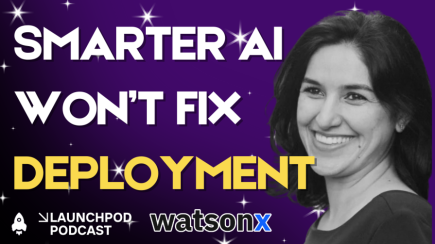
Maryam Ashoori, VP of Product and Engineering at IBM’s Watsonx platform, talks about the messy reality of enterprise AI deployment.
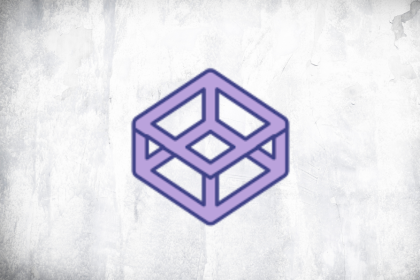
A product manager’s guide to deciding when automation is enough, when AI adds value, and how to make the tradeoffs intentionally.
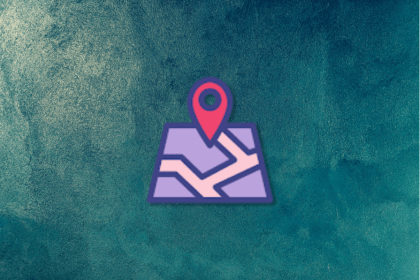
How AI reshaped product management in 2025 and what PMs must rethink in 2026 to stay effective in a rapidly changing product landscape.
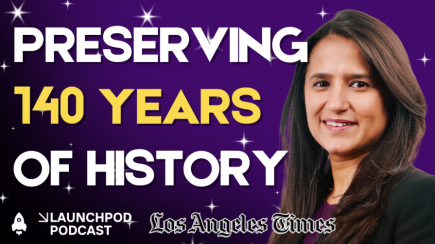
Deepika Manglani, VP of Product at the LA Times, talks about how she’s bringing the 140-year-old institution into the future.